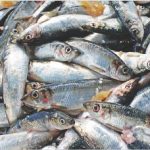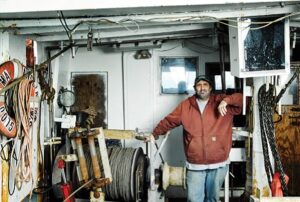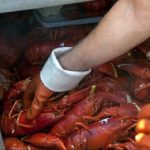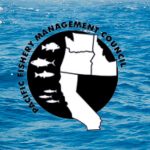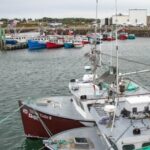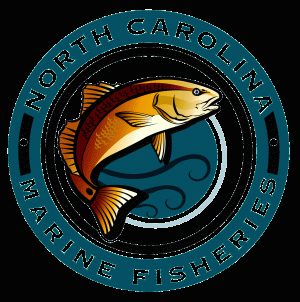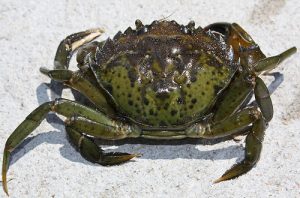Tag Archives: Department of Marine Resources
Fishermen, regulators disagree over cause of Brunswick fish kill
 As a massive vacuum truck from Clean Harbors traveled along the shoreline near Simpsons Point midweek to clean up rotting pogies, local fishermen were battling what they say was a raft of misinformation put forth by the state about how and why those pogies were dumped from a local fishing vessel on June 6. On Tuesday, a day after residents of the Simpsons Point area asked town councilors to help pay for a professional cleanup of the fish, local lobsterman Steve Anderson posted a 10-minute video on YouTube, taking local media to task for only reporting part of the story and excoriating the Maine Department of Marine Resources for a quota system Anderson said simply doesn’t work.,,, But Jeff Nichols, spokesman for the DMR, said Friday that Anderson “got a lot of things wrong,” click here to read the story 08:35
As a massive vacuum truck from Clean Harbors traveled along the shoreline near Simpsons Point midweek to clean up rotting pogies, local fishermen were battling what they say was a raft of misinformation put forth by the state about how and why those pogies were dumped from a local fishing vessel on June 6. On Tuesday, a day after residents of the Simpsons Point area asked town councilors to help pay for a professional cleanup of the fish, local lobsterman Steve Anderson posted a 10-minute video on YouTube, taking local media to task for only reporting part of the story and excoriating the Maine Department of Marine Resources for a quota system Anderson said simply doesn’t work.,,, But Jeff Nichols, spokesman for the DMR, said Friday that Anderson “got a lot of things wrong,” click here to read the story 08:35
Brunswick Maine fish kill. The Real Story, not that Fake News stuff. – click here to watch the video
Hearing on new shrimp rules draws tiny crowd in Ellsworth
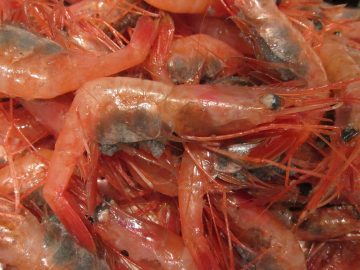 Fishermen barely outnumbered representatives of the Atlantic States Marine Fisheries Commission last Thursday at a public hearing in City Hall on proposed rule changes that would reshape shrimp fishing in the Gulf of Maine. Three fishermen — John Williams and Ricky Trundy, both of Stonington, and James West of Sorrento — offered comments on a proposed amendment to the ASMFC fisheries management plan for northern shrimp. Department of Marine Resources External Affairs Director Terry Stockwell and Resource Management Coordinator Trisha Cheney dutifully recorded those comments on behalf of the ASMFC. Although a somewhat larger crowd was on hand for a hearing the previous evening in Augusta, the sparse audience reflected the state of the fishery from Downeast waters. click here to read the story 12:34
Fishermen barely outnumbered representatives of the Atlantic States Marine Fisheries Commission last Thursday at a public hearing in City Hall on proposed rule changes that would reshape shrimp fishing in the Gulf of Maine. Three fishermen — John Williams and Ricky Trundy, both of Stonington, and James West of Sorrento — offered comments on a proposed amendment to the ASMFC fisheries management plan for northern shrimp. Department of Marine Resources External Affairs Director Terry Stockwell and Resource Management Coordinator Trisha Cheney dutifully recorded those comments on behalf of the ASMFC. Although a somewhat larger crowd was on hand for a hearing the previous evening in Augusta, the sparse audience reflected the state of the fishery from Downeast waters. click here to read the story 12:34
Controversial bill allowing secret tracking devices on lobster boats wins Maine Senate approval
![]() A compromise has been reached over a controversial bill that would allow the Department of Marine Resources to secretly place tracking devices on lobster boats. The measure is aimed at cracking down on violators of lobstering laws. The Maine Lobstermen’s Union had been strongly opposed to the bill, saying it gave the commissioner too much authority by allowing him to covertly track boats. But after a discussion with the commissioner this morning the union now backs the bill. “So we have a lot more people fishing offshore, much more difficult to catch violators offshore,” said Patrice McCarron of the Maine Lobstermen’s Association. McCarron said if allowing investigators to covertly place tracking devices on boats of suspected cheaters leads to more arrests, the industry will be better off. Video, click here to read the story 11:30
A compromise has been reached over a controversial bill that would allow the Department of Marine Resources to secretly place tracking devices on lobster boats. The measure is aimed at cracking down on violators of lobstering laws. The Maine Lobstermen’s Union had been strongly opposed to the bill, saying it gave the commissioner too much authority by allowing him to covertly track boats. But after a discussion with the commissioner this morning the union now backs the bill. “So we have a lot more people fishing offshore, much more difficult to catch violators offshore,” said Patrice McCarron of the Maine Lobstermen’s Association. McCarron said if allowing investigators to covertly place tracking devices on boats of suspected cheaters leads to more arrests, the industry will be better off. Video, click here to read the story 11:30
Maine Lobstermen Support GPS Tracking of Lawbreakers Fishing Vessels – Lobstermen from Swans Island are fed up with the bad behavior of fellow fishermen who violate regulations within the states most valuable fishery. Video, click here to read the story 12:02
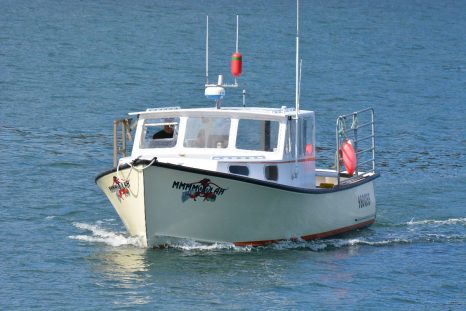
Limited-entry waiting list shortens
Fishermen on the Zone B commercial lobster and crab license waiting list have been bumped up several slots following last year’s council decision to amend the exit ratio for its limited-entry system. The Lobster Zone B Management Council heard that good news last Tuesday during a regular council meeting. Council members last year amended the exit ratio from one license issued for every five licenses retired to one license issued for every three licenses retired to help speed up the licensing process. Zone B is one of the most restrictive zones. Some people have been on the list for more than 10 years. Currently, there are 37 names on the list. click here to read the story 13:05
Can scallops be farmed in Penobscot Bay?
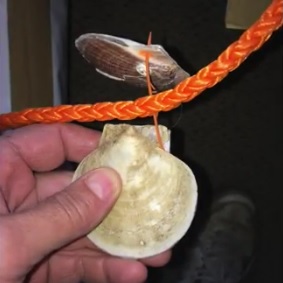 Everybody knows that the waters off Stonington are a rich source of wild scallops. Could they also be a good place to farm them? Robert Brewer of Deer Isle hopes to find out. Brewer recently applied to the for a 3.8-acre experimental aquaculture lease in East Penobscot Bay, where he plans to grow scallops on suspended ropes using the ear-hanging method developed in Japan. The technique calls for drilling a tiny hole through the flat “ear” at the base of the scallop shell and inserting a plastic pin with a small line attached. The scallops are hung in pairs along ropes called “droppers” that hang vertically beneath the surface.,,, DMR has opened a 30-day comment period for Brewer’s application. Click here to read the story 13:12
Everybody knows that the waters off Stonington are a rich source of wild scallops. Could they also be a good place to farm them? Robert Brewer of Deer Isle hopes to find out. Brewer recently applied to the for a 3.8-acre experimental aquaculture lease in East Penobscot Bay, where he plans to grow scallops on suspended ropes using the ear-hanging method developed in Japan. The technique calls for drilling a tiny hole through the flat “ear” at the base of the scallop shell and inserting a plastic pin with a small line attached. The scallops are hung in pairs along ropes called “droppers” that hang vertically beneath the surface.,,, DMR has opened a 30-day comment period for Brewer’s application. Click here to read the story 13:12
Maine – Fishing surveillance bill amended
 A bill that would authorize the Department of Marine Resources to conduct surreptitious electronic surveillance of lobster boats drew mixed reviews at a hearing by the Legislature’s Marine Resources Committee in April. But at a work session last Wednesday, the committee voted to recommend passage of an amended version of the bill. Introduced by Rep. Walter Kumiega (D-Deer Isle) at the request of the Department of Marine Resources, LD 1379 — as initially formulated — would have given the DMR commissioner authority to approve installation of electronic tracking devices on lobster boats without first getting a warrant from a judge. The approval would have been based on an affidavit from the chief of the Marine Patrol that he had “probable cause” to believe that a civil violation of the laws regulating the placement or hauling of lobster gear had occurred. At its work session last week, the committee scrapped the idea of authorizing the commissioner to approve installation of tracking devices and took a new approach. click here to read the story 11:53
A bill that would authorize the Department of Marine Resources to conduct surreptitious electronic surveillance of lobster boats drew mixed reviews at a hearing by the Legislature’s Marine Resources Committee in April. But at a work session last Wednesday, the committee voted to recommend passage of an amended version of the bill. Introduced by Rep. Walter Kumiega (D-Deer Isle) at the request of the Department of Marine Resources, LD 1379 — as initially formulated — would have given the DMR commissioner authority to approve installation of electronic tracking devices on lobster boats without first getting a warrant from a judge. The approval would have been based on an affidavit from the chief of the Marine Patrol that he had “probable cause” to believe that a civil violation of the laws regulating the placement or hauling of lobster gear had occurred. At its work session last week, the committee scrapped the idea of authorizing the commissioner to approve installation of tracking devices and took a new approach. click here to read the story 11:53
Lobster buyer gets his license yanked
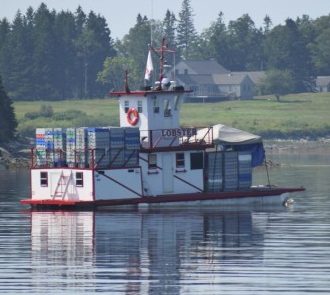 A hearing examiner has upheld the one-year suspension of the license of a lobster buyer accused of failing to report a portion of the purchases made off a barge based in Seal Cove in Tremont. In August, Maine Marine Patrol officers summonsed Donald Crabtree Sr. of Crabtree Seafood in Brewer on a charge of violating the Department of Marine Resources’ (DMR) reporting requirements, a civil violation. Crabtree appealed his suspension. A hearing examiner last week determined that the suspension is justified, according to Sgt. Troy Dow of the marine patrol. Crabtree began using the town-owned Seal Cove Wharf as a base for his lobster business in the spring of 2015. He was mooring his 45-foot barge there and used the facility’s ramp to load bait before motoring into Blue Hill Bay to sell bait to fishermen and buy lobsters from them. The day’s catch later was offloaded at the ramp. click here to read the story 11:16
A hearing examiner has upheld the one-year suspension of the license of a lobster buyer accused of failing to report a portion of the purchases made off a barge based in Seal Cove in Tremont. In August, Maine Marine Patrol officers summonsed Donald Crabtree Sr. of Crabtree Seafood in Brewer on a charge of violating the Department of Marine Resources’ (DMR) reporting requirements, a civil violation. Crabtree appealed his suspension. A hearing examiner last week determined that the suspension is justified, according to Sgt. Troy Dow of the marine patrol. Crabtree began using the town-owned Seal Cove Wharf as a base for his lobster business in the spring of 2015. He was mooring his 45-foot barge there and used the facility’s ramp to load bait before motoring into Blue Hill Bay to sell bait to fishermen and buy lobsters from them. The day’s catch later was offloaded at the ramp. click here to read the story 11:16
Trying to make a living
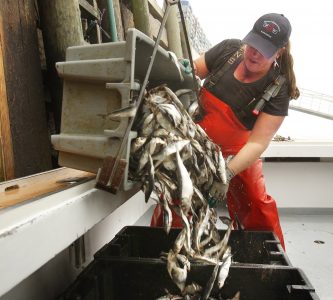 As soon as Old Man Winter indicates he’s loosening his grip on the Maine coast and spring is finally in the air, lobstermen will begin to rig their traps in preparation for the upcoming fishing season. One of their prime concerns this year, as in any year, will be questions about bait supplies and costs. Like other businessmen, how much money lobstermen take home at the end of the day, and what their annual profits will be, depends upon their costs and the price per pound their lobsters bring at the dock. In addition to any boat payments they may have, and for some fishermen with newer boats, these are high, they’ll be eyeing current fuel and bait costs.,, continue reading the op-ed here 10:32
As soon as Old Man Winter indicates he’s loosening his grip on the Maine coast and spring is finally in the air, lobstermen will begin to rig their traps in preparation for the upcoming fishing season. One of their prime concerns this year, as in any year, will be questions about bait supplies and costs. Like other businessmen, how much money lobstermen take home at the end of the day, and what their annual profits will be, depends upon their costs and the price per pound their lobsters bring at the dock. In addition to any boat payments they may have, and for some fishermen with newer boats, these are high, they’ll be eyeing current fuel and bait costs.,, continue reading the op-ed here 10:32
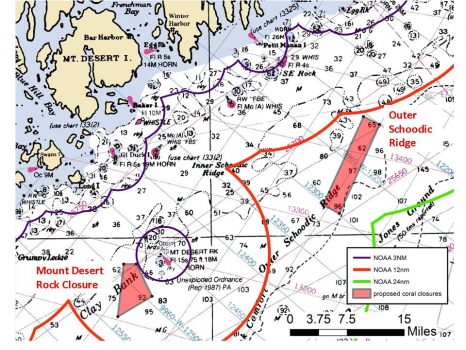
Potential coral protection rules could have big impact on Downeast lobstermen
The New England Fishery Management Council has put rules to protect deep sea corals on the fast track, rules that will have a major impact on lobstermen — primarily from zones A and B with some from Zone C — who set their gear around Mount Desert Rock and Outer Schoodic Ridge. The council is considering management measures to reduce impacts to corals from commercial fishing activities in three areas in the Gulf of Maine. One of the proposals would impose a total ban on fishing in the protected areas which, according to an analysis the Department of Marine Resources submitted to the council several months ago, are located in waters that produce about one-third of Maine’s lobster landings in terms of value. Now DMR is asking lobstermen who fish in the potentially closed areas for information that will help the department in its efforts to prevent the fishing bans. continue reading the article here 08:38
Maine’s Scallop season off to a good start
 Five weeks into the scallop season the winter weather has begun to take a toll on fishing days, but not on landings. According to the Department of Marine Resources, when fishermen have been able to get off the mooring they have been seeing good landing. With snow, bitter temperatures and howling winds increasingly the norm since the last week of December, scallopers working outside the well-protected waters of Cobscook Bay got a break — or at least a chance for some relief — when several limited access areas opened to fishing on Monday, Jan. 2. While four segments of the coast were closed to fishing on New Year’s Day after their harvest targets were reached, the opening of the limited access areas gave an additional opportunity to the drag fleet in more protected waters once a week. So far, boat prices remain strong, and have even strengthened since the season’s opening. Read the story here 08:03
Five weeks into the scallop season the winter weather has begun to take a toll on fishing days, but not on landings. According to the Department of Marine Resources, when fishermen have been able to get off the mooring they have been seeing good landing. With snow, bitter temperatures and howling winds increasingly the norm since the last week of December, scallopers working outside the well-protected waters of Cobscook Bay got a break — or at least a chance for some relief — when several limited access areas opened to fishing on Monday, Jan. 2. While four segments of the coast were closed to fishing on New Year’s Day after their harvest targets were reached, the opening of the limited access areas gave an additional opportunity to the drag fleet in more protected waters once a week. So far, boat prices remain strong, and have even strengthened since the season’s opening. Read the story here 08:03
Are Maine halibut headed for trouble?
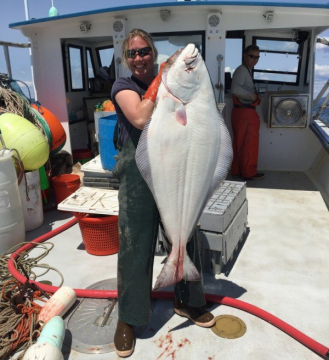 Go to Scales, an elegant waterfront restaurant on a Portland pier, and a plate of pan-roasted halibut with hazelnuts, brown butter and new potatoes will cost you $38, tax and tip extra. Go down to the dock in Lubec or Stonington during May and June, when Maine fishermen are allowed to harvest halibut from state waters inside the three-mile limit, and $38 would buy you about 5 pounds of halibut, if you could buy less than a whole fish directly off the boat. And that’s the problem. Over the decade between 2006 and 2015, the last year for which the Department of Marine Resources has figures, the boat price for halibut increased some 44 percent and landings increased from just 30,018 pounds worth about $139,000 to more than 93,000 pounds that brought fishermen some $623,000. Now federal fisheries regulators are saying that halibut may be in trouble. Read the story here 12:14
Go to Scales, an elegant waterfront restaurant on a Portland pier, and a plate of pan-roasted halibut with hazelnuts, brown butter and new potatoes will cost you $38, tax and tip extra. Go down to the dock in Lubec or Stonington during May and June, when Maine fishermen are allowed to harvest halibut from state waters inside the three-mile limit, and $38 would buy you about 5 pounds of halibut, if you could buy less than a whole fish directly off the boat. And that’s the problem. Over the decade between 2006 and 2015, the last year for which the Department of Marine Resources has figures, the boat price for halibut increased some 44 percent and landings increased from just 30,018 pounds worth about $139,000 to more than 93,000 pounds that brought fishermen some $623,000. Now federal fisheries regulators are saying that halibut may be in trouble. Read the story here 12:14
Marine Patrol seeks permission to bug boats that fish for “bugs”
 Last November, the Marine Patrol charged a Spruce Head lobsterman with fishing 156 lobster traps more than the 800 he was authorized to fish. In October, a trap war between fisherman from Lobster Management Zones B and C reached such epic proportions that the state offered a $15,000 reward for information that could help the Marine Patrol with its investigation of incidents that, according to the Department of Marine Resources, had generated considerably more than $350,000 in lost gear. Zone B extends from Schoodic Point to Newbury Neck in Blue Hill Bay while Zone C stretches from Newbury Neck to Cape Rosier. Long before all that excitement came to public attention, DMR last April proposed legislation that would significantly expand the Marine Patrol’s authority to place electronic surveillance devices on commercial fishing boats surreptitiously, without first obtaining a search warrant from a judge or permission from the boat owner. Read the story here 08:42
Last November, the Marine Patrol charged a Spruce Head lobsterman with fishing 156 lobster traps more than the 800 he was authorized to fish. In October, a trap war between fisherman from Lobster Management Zones B and C reached such epic proportions that the state offered a $15,000 reward for information that could help the Marine Patrol with its investigation of incidents that, according to the Department of Marine Resources, had generated considerably more than $350,000 in lost gear. Zone B extends from Schoodic Point to Newbury Neck in Blue Hill Bay while Zone C stretches from Newbury Neck to Cape Rosier. Long before all that excitement came to public attention, DMR last April proposed legislation that would significantly expand the Marine Patrol’s authority to place electronic surveillance devices on commercial fishing boats surreptitiously, without first obtaining a search warrant from a judge or permission from the boat owner. Read the story here 08:42
Lobster buyer charged
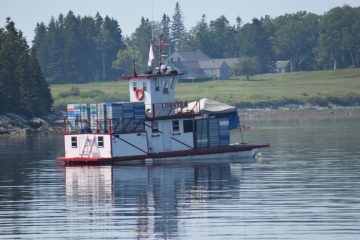 A lobster buyer based out of Seal Cove is facing a year’s suspension of his license and a fine for allegedly violating Department of Marine Resources (DMR) reporting requirements. Donald Crabtree Sr., 48, of Crabtree Seafood in Brewer was summonsed Aug. 10 on a charge of violating the reporting requirements rule Chapter 8, a civil violation. Crabtree is scheduled to appear in Hancock County Unified Criminal Court for a dispositional conference on Dec. 16. According to Jeff Nichols, communications director of the DMR, the charge follows an investigation that began in the summer months of 2015 and continued through much of the summer of 2016. Crabtree is accused of buying lobsters from fishermen and not giving out sales receipts, Nichols said. Lobster buyers are required to report all transactions, including those made with cash. Read the story here 08:59
A lobster buyer based out of Seal Cove is facing a year’s suspension of his license and a fine for allegedly violating Department of Marine Resources (DMR) reporting requirements. Donald Crabtree Sr., 48, of Crabtree Seafood in Brewer was summonsed Aug. 10 on a charge of violating the reporting requirements rule Chapter 8, a civil violation. Crabtree is scheduled to appear in Hancock County Unified Criminal Court for a dispositional conference on Dec. 16. According to Jeff Nichols, communications director of the DMR, the charge follows an investigation that began in the summer months of 2015 and continued through much of the summer of 2016. Crabtree is accused of buying lobsters from fishermen and not giving out sales receipts, Nichols said. Lobster buyers are required to report all transactions, including those made with cash. Read the story here 08:59
Lobstermen accused of ‘scrubbing’ female lobsters get license suspensions
 The licenses of two Maine lobstermen have been suspended for six years because the Department of Marine Resources determined that the men illegally removed eggs from female lobsters. Dexter Bray Jr., 36, of Stonington and Philip Poland, 42, of Cushing will lose their licenses as the result of separate investigations, the Department of Marine Resources said Tuesday in a press release. Bray is accused of “scrubbing” female lobsters – removing eggs from the underside of a female lobster’s tail. Marine Patrol investigators said an anonymous tipster contacted them last spring and told them that Bray had tried to sell two egg-bearing lobsters at a lobster co-op in Stonington. Bray could face a fine of as much as $1,600. Investigators who received an anonymous complaint last summer said that Poland removed eggs from three female lobsters. Poland could face a fine of as much as $1,900. Read the rest of the story here 07:50
The licenses of two Maine lobstermen have been suspended for six years because the Department of Marine Resources determined that the men illegally removed eggs from female lobsters. Dexter Bray Jr., 36, of Stonington and Philip Poland, 42, of Cushing will lose their licenses as the result of separate investigations, the Department of Marine Resources said Tuesday in a press release. Bray is accused of “scrubbing” female lobsters – removing eggs from the underside of a female lobster’s tail. Marine Patrol investigators said an anonymous tipster contacted them last spring and told them that Bray had tried to sell two egg-bearing lobsters at a lobster co-op in Stonington. Bray could face a fine of as much as $1,600. Investigators who received an anonymous complaint last summer said that Poland removed eggs from three female lobsters. Poland could face a fine of as much as $1,900. Read the rest of the story here 07:50
Dec. 1 – Scallop season opens with high hopes
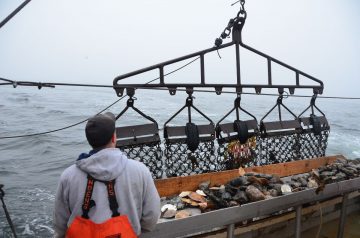 After an eight-month hiatus when, like summer tourists, the only scallops in local stores are “from away,” the Maine scallop fishing season is finally opening, at least for a handful of harvesters. All along the coastline, licensed scallop divers are allowed to start fishing for the succulent bivalves today, Thursday, Dec. 1. Dragger fishermen will have to wait to wet their gear until next Monday, Dec. 5. The season opens on an optimistic note. Over the past five years, scallop landings have increased steadily, from just over 175,000 pounds of scallop meats (about 1.5 million pounds in the shell) during 2011 to almost 453,000 pounds in 2015. According to Trisha Cheney, a resource management coordinator at the Department of Marine Resources, 635 harvesters—77 divers and 558 draggers–had licenses to fish for scallops last year and are eligible to get licenses in 2016. Of that group, Cheney said, 445 licensed harvesters actually participated in the fishery. There were, she said, 52 active divers, 373 active draggers and 20 “unknown” harvesters who DMR can’t identify as working in either category. In 2009, only 168 harvesters fished for scallops in Maine. Read the story here 21:32
After an eight-month hiatus when, like summer tourists, the only scallops in local stores are “from away,” the Maine scallop fishing season is finally opening, at least for a handful of harvesters. All along the coastline, licensed scallop divers are allowed to start fishing for the succulent bivalves today, Thursday, Dec. 1. Dragger fishermen will have to wait to wet their gear until next Monday, Dec. 5. The season opens on an optimistic note. Over the past five years, scallop landings have increased steadily, from just over 175,000 pounds of scallop meats (about 1.5 million pounds in the shell) during 2011 to almost 453,000 pounds in 2015. According to Trisha Cheney, a resource management coordinator at the Department of Marine Resources, 635 harvesters—77 divers and 558 draggers–had licenses to fish for scallops last year and are eligible to get licenses in 2016. Of that group, Cheney said, 445 licensed harvesters actually participated in the fishery. There were, she said, 52 active divers, 373 active draggers and 20 “unknown” harvesters who DMR can’t identify as working in either category. In 2009, only 168 harvesters fished for scallops in Maine. Read the story here 21:32
Effort to protect deep-sea coral has lobster industry on alert
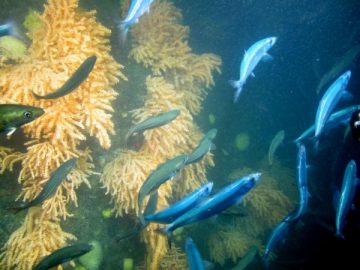 Over 400 Maine lobstermen could lose their traditional fishing territory under a proposal to protect deep-sea corals in the Gulf of Maine. The New England Fishery Management Council is considering a plan that would ban fishing in four designated coral zones spanning about 161 miles of federal waters in the Gulf of Maine – Mount Desert Rock, Outer Schoodic Ridge, Jordan Basin and Lindenkohl Knoll. Here, often on steep rock walls deep under water where sunlight cannot penetrate, scientists have found dense, delicate and slow-growing coral gardens of sea whips, fans and pens. During the cold-weather months, when 52-year-old Jim Dow usually fishes for hard-shell lobsters in deep federal waters, his buoys will encircle Mount Desert Rock, where the lobster is so plentiful that boats will sail for hours to drop traps there. As a result, fishermen call it the Meeting Grounds. He said word is just starting to spread about the coral protection plan, but he said the fishermen he has talked with say they didn’t even know there was coral in the deep canyons below. Read the rest here 10:16
Over 400 Maine lobstermen could lose their traditional fishing territory under a proposal to protect deep-sea corals in the Gulf of Maine. The New England Fishery Management Council is considering a plan that would ban fishing in four designated coral zones spanning about 161 miles of federal waters in the Gulf of Maine – Mount Desert Rock, Outer Schoodic Ridge, Jordan Basin and Lindenkohl Knoll. Here, often on steep rock walls deep under water where sunlight cannot penetrate, scientists have found dense, delicate and slow-growing coral gardens of sea whips, fans and pens. During the cold-weather months, when 52-year-old Jim Dow usually fishes for hard-shell lobsters in deep federal waters, his buoys will encircle Mount Desert Rock, where the lobster is so plentiful that boats will sail for hours to drop traps there. As a result, fishermen call it the Meeting Grounds. He said word is just starting to spread about the coral protection plan, but he said the fishermen he has talked with say they didn’t even know there was coral in the deep canyons below. Read the rest here 10:16
1st Biloxi Bay oyster harvest of 21st century opens Tuesday
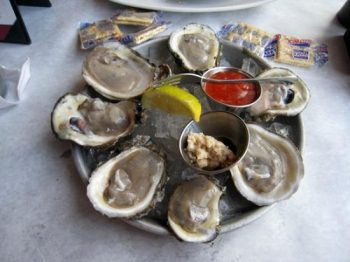 For the first time in at least 40 years, Biloxi Bay will open for oyster harvesting. The state Department of Marine Resources said in a news release reefs in the Biloxi Bay portion of the Mississippi Sound will open at sunrise Tuesday. DMR Executive Director Jamie Miller says the harvest of oysters for the first time in 40-plus years in Biloxi Bay is nothing less than historic. Miller says the opening of the oyster reefs confirms water quality has improved in the Bay. Officials say harvesting is limited to oyster tonging. No dredging will be allowed. The limit is 15 sacks per day. Artificial reefs will not be open for oyster harvesting. There will be a station in the Ocean Springs Harbor for fishermen to check in and out each day. link 10:26
For the first time in at least 40 years, Biloxi Bay will open for oyster harvesting. The state Department of Marine Resources said in a news release reefs in the Biloxi Bay portion of the Mississippi Sound will open at sunrise Tuesday. DMR Executive Director Jamie Miller says the harvest of oysters for the first time in 40-plus years in Biloxi Bay is nothing less than historic. Miller says the opening of the oyster reefs confirms water quality has improved in the Bay. Officials say harvesting is limited to oyster tonging. No dredging will be allowed. The limit is 15 sacks per day. Artificial reefs will not be open for oyster harvesting. There will be a station in the Ocean Springs Harbor for fishermen to check in and out each day. link 10:26
Declining biotoxin levels – Some Down East shellfishing areas reopened
On Thursday, the Department of Marine Resources re-opened some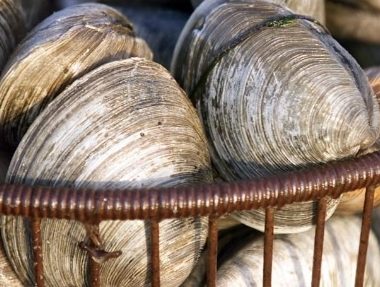 of the coastline between Calais and Cutler for the harvest of clams, mussels and carnivorous snails, and said clamming will be allowed on a portion of the coast between Isle Au Haut to Winter Harbor. Shellfish harvesting on much of the Down East coast remains restricted because of an algae bloom that produces a toxin that can cause amnesic shellfish poisoning, or ASP, in humans. It is unclear if the limited reopening Thursday means the bloom is clearing up or if harvesting bans will be removed in other areas soon. “We can’t speculate, but we continue to test shellfish and phytoplankton along the coast, both inside and outside the impacted areas, and will re-open areas as soon as test results allow,” said Jeff Nichols, a spokesman for the department of Marine Resources. Lifting the emergency restrictions was a relief to clammers who have been kept off the flats for the last two weeks. Read the story here 08:32
of the coastline between Calais and Cutler for the harvest of clams, mussels and carnivorous snails, and said clamming will be allowed on a portion of the coast between Isle Au Haut to Winter Harbor. Shellfish harvesting on much of the Down East coast remains restricted because of an algae bloom that produces a toxin that can cause amnesic shellfish poisoning, or ASP, in humans. It is unclear if the limited reopening Thursday means the bloom is clearing up or if harvesting bans will be removed in other areas soon. “We can’t speculate, but we continue to test shellfish and phytoplankton along the coast, both inside and outside the impacted areas, and will re-open areas as soon as test results allow,” said Jeff Nichols, a spokesman for the department of Marine Resources. Lifting the emergency restrictions was a relief to clammers who have been kept off the flats for the last two weeks. Read the story here 08:32
Two lobstermen accused of fishing violations following seven-month DMR investigation
 A fisherman accused of trying to secretly catch lobsters and his sternman have been charged with multiple fishing violations, according to state officials. Duston Reed, a 34 year-old lobsterman from Waldoboro, was arrested Aug. 18 by the Maine Marine Patrol and taken to the Two Bridges Regional Jail in Wiscasset. The arrests of Reed and his sternman, Jeremy Yeaton of Friendship, came after a seven-month investigation, according to a news release from the Maine Department of Marine Resources. Reed was charged with fishing lobster traps that were not marked with a buoy, fishing untagged lobster traps, falsifying physical evidence and tampering with a witness. A total of 40 unmarked, untagged traps allegedly owned by Reed were recovered by Marine Patrol officers after an investigation determined where they were being used. Read the story here 21:55
A fisherman accused of trying to secretly catch lobsters and his sternman have been charged with multiple fishing violations, according to state officials. Duston Reed, a 34 year-old lobsterman from Waldoboro, was arrested Aug. 18 by the Maine Marine Patrol and taken to the Two Bridges Regional Jail in Wiscasset. The arrests of Reed and his sternman, Jeremy Yeaton of Friendship, came after a seven-month investigation, according to a news release from the Maine Department of Marine Resources. Reed was charged with fishing lobster traps that were not marked with a buoy, fishing untagged lobster traps, falsifying physical evidence and tampering with a witness. A total of 40 unmarked, untagged traps allegedly owned by Reed were recovered by Marine Patrol officers after an investigation determined where they were being used. Read the story here 21:55
Swipe card system will help track Maine sea urchin fishery
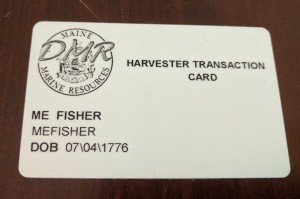 Maine’s 2016-2017 sea urchin season will be a repeat of last season in terms of the number of fishing days and daily landing limits. But state regulators are launching a new swipe card system to track the activity of harvesters and dealers. The Department of Marine Resources (DMR) hopes the system will create efficiencies for fishermen, dealers and DMR staff. They also hope it will support efforts to keep the fishery sustainable. By automating required weekly dealer reports, previously done on paper, “swipe cards reduce the chance of human error which can occur when transcribing landings information,” said Trisha Cheney, DMR resource management coordinator for sea urchins. Read the story here 10:08
Maine’s 2016-2017 sea urchin season will be a repeat of last season in terms of the number of fishing days and daily landing limits. But state regulators are launching a new swipe card system to track the activity of harvesters and dealers. The Department of Marine Resources (DMR) hopes the system will create efficiencies for fishermen, dealers and DMR staff. They also hope it will support efforts to keep the fishery sustainable. By automating required weekly dealer reports, previously done on paper, “swipe cards reduce the chance of human error which can occur when transcribing landings information,” said Trisha Cheney, DMR resource management coordinator for sea urchins. Read the story here 10:08
Shortage of herring for lobster bait market maxes out Maines Pogey Quota for the first time.
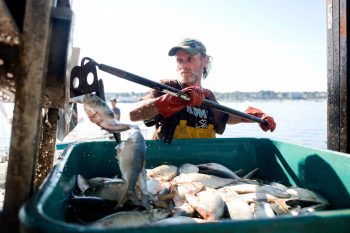 The offshore supply of fresh Atlantic herring, the go-to bait for most Maine lobstermen, has been in short supply, driving prices up as much 30 percent in late July, the Maine Lobstermen’s Association said. The shortage triggered near-shore fishing restrictions to try to stretch out the summer herring catch in hopes of keeping bait bags full as Maine’s lobster season hits its peak. With herring getting scarce and expensive, fishermen have turned to other bait for relief, especially the pogie, the local name for Atlantic menhaden. It’s the No. 2 bait fish among Maine lobstermen, according to a state Department of Marine Resources survey. Maine fishermen have never landed the state’s entire pogie quota, which is set at about 166,000 pounds annually. But this year they had caught all of that and a bit more by July 31, said Megan Ware, head of the menhaden program for the Atlantic States Marine Fisheries Commission, which oversees the pogie catch and other migratory fisheries on the East Coast. Read the story here 09:41
The offshore supply of fresh Atlantic herring, the go-to bait for most Maine lobstermen, has been in short supply, driving prices up as much 30 percent in late July, the Maine Lobstermen’s Association said. The shortage triggered near-shore fishing restrictions to try to stretch out the summer herring catch in hopes of keeping bait bags full as Maine’s lobster season hits its peak. With herring getting scarce and expensive, fishermen have turned to other bait for relief, especially the pogie, the local name for Atlantic menhaden. It’s the No. 2 bait fish among Maine lobstermen, according to a state Department of Marine Resources survey. Maine fishermen have never landed the state’s entire pogie quota, which is set at about 166,000 pounds annually. But this year they had caught all of that and a bit more by July 31, said Megan Ware, head of the menhaden program for the Atlantic States Marine Fisheries Commission, which oversees the pogie catch and other migratory fisheries on the East Coast. Read the story here 09:41
Kevin Kelly – scallop counter for the Maine Department of Marine Resources
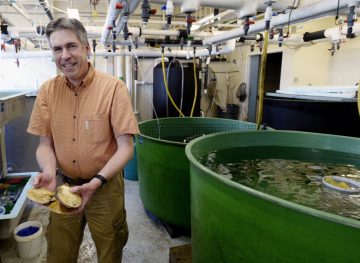 Kevin Kelly has been at the Department of Marine Resources for almost 32 years, working on the groundfish and lobster fisheries before being assigned to scallops about nine years ago. He’s very fond of the fishery and the tough souls who making a living from it during Maine’s toughest season. “It’s dwarfed by lobster of course, but to the people that do it is a really big deal, especially with the loss of some of these other fisheries,” he said referring to shrimp and groundfish. We called him up to talk methods, marine resources and menus. Despite the expertise he’s developed, he’s not a scallop biologist. “My own kids probably think I sit at a desk and stare at scallops all day. But I deal more with the fishery and assessments than with the organism.” Was it part of his grand plan to spend his whole career at the Department of Marine Resources? He chuckled. “That was a long time ago. I can’t remember my plan.” Read the story here 08:35
Kevin Kelly has been at the Department of Marine Resources for almost 32 years, working on the groundfish and lobster fisheries before being assigned to scallops about nine years ago. He’s very fond of the fishery and the tough souls who making a living from it during Maine’s toughest season. “It’s dwarfed by lobster of course, but to the people that do it is a really big deal, especially with the loss of some of these other fisheries,” he said referring to shrimp and groundfish. We called him up to talk methods, marine resources and menus. Despite the expertise he’s developed, he’s not a scallop biologist. “My own kids probably think I sit at a desk and stare at scallops all day. But I deal more with the fishery and assessments than with the organism.” Was it part of his grand plan to spend his whole career at the Department of Marine Resources? He chuckled. “That was a long time ago. I can’t remember my plan.” Read the story here 08:35
Commercial Fisherman Andy Mays given the first DMR Excellence Award. Congratulations, Andy!
 Andy Mays is not often at a loss for words. But when the Southwest Harbor lobster fisherman and scalloper was called up on stage at the Fisherman’s Forum banquet earlier this month to receive a new award from Department of Marine Resources (DMR) Commissioner Patrick Keliher, he was caught off guard. “I’m speechless. I think this is the first time I’ve ever been speechless,” he said. The DMR Excellence Award, presented for the first time this year, recognizes industry members who participate with the department to ensure a sustainable future for Maine’s commercial fisheries. Mays was honored for his 25-plus years of service and participation on DMR advisory councils. A great story about a great guy. Read the rest here 14:41
Andy Mays is not often at a loss for words. But when the Southwest Harbor lobster fisherman and scalloper was called up on stage at the Fisherman’s Forum banquet earlier this month to receive a new award from Department of Marine Resources (DMR) Commissioner Patrick Keliher, he was caught off guard. “I’m speechless. I think this is the first time I’ve ever been speechless,” he said. The DMR Excellence Award, presented for the first time this year, recognizes industry members who participate with the department to ensure a sustainable future for Maine’s commercial fisheries. Mays was honored for his 25-plus years of service and participation on DMR advisory councils. A great story about a great guy. Read the rest here 14:41
2015 a half-billion dollar lobsterpalooza for Maine fishermen
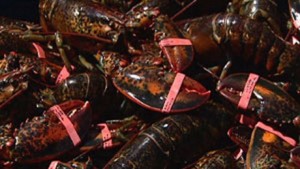 The Department of Marine Resources released its preliminary 2015 commercial fisheries landings Thursday night and the news was astonishing. According to DMR, the value of Maine’s commercially harvested marine resources topped $600 million in overall value in 2015. The total, $631,768,531, is an all-time high and an increase of more than $33 million over the previous record set in 2014. The largest single increase in value was in the state’s lobster fishery, which saw its total landed value jump by more than $37 million and the average per pound boat price increase by more than 10 percent, from $3.70 per pound in 2014 to $4.09 per pound last year. Read the rest here 08:59
The Department of Marine Resources released its preliminary 2015 commercial fisheries landings Thursday night and the news was astonishing. According to DMR, the value of Maine’s commercially harvested marine resources topped $600 million in overall value in 2015. The total, $631,768,531, is an all-time high and an increase of more than $33 million over the previous record set in 2014. The largest single increase in value was in the state’s lobster fishery, which saw its total landed value jump by more than $37 million and the average per pound boat price increase by more than 10 percent, from $3.70 per pound in 2014 to $4.09 per pound last year. Read the rest here 08:59
Marine Resources Committee approves stripped-down version of lobster license changes
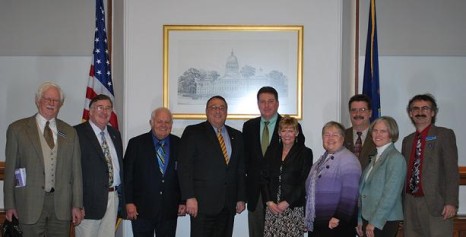 Lawmakers on the committee that handles marine resources issues voted Wednesday to make modest changes in the rules that control lobster fishing licenses in Maine, side-stepping a more controversial proposal for access to Maine’s most lucrative fishery. Members of the Marine Resources Committee voted 11-1 to increase the age for young people to finish a required apprenticeship program, and to take steps to verify the validity of hundreds of names on a license waiting list. The action was a compromise between attempts by the Department of Marine Resources to trim the waiting list without hurting the resource and established lobstermen, who were opposed to what they saw as a loss of control and the potential for overfishing. Read the rest here 14:38
Lawmakers on the committee that handles marine resources issues voted Wednesday to make modest changes in the rules that control lobster fishing licenses in Maine, side-stepping a more controversial proposal for access to Maine’s most lucrative fishery. Members of the Marine Resources Committee voted 11-1 to increase the age for young people to finish a required apprenticeship program, and to take steps to verify the validity of hundreds of names on a license waiting list. The action was a compromise between attempts by the Department of Marine Resources to trim the waiting list without hurting the resource and established lobstermen, who were opposed to what they saw as a loss of control and the potential for overfishing. Read the rest here 14:38
Maine Lobstermen pack Augusta hearing on controversial proposed licensing changes
 Seth Morrissette works as a sternman on a lobster boat out of Friendship. He came to the podium at the Legislature’s Marine Resources committee, Wednesday, carrying his 3-year-old son, Levi, on his shoulders. His voice cracking, he told the lawmakers that his son would get his lobster license before he did. Morrissette was among a group who testified in support of a series of changes that would, in the words of Marine Resources Commissioner Patrick Keliher, “strike a difficult balance” between 5,800 current license holders and the nearly 300 on a long and unpredictable waiting list. Read the article here 21:21
Seth Morrissette works as a sternman on a lobster boat out of Friendship. He came to the podium at the Legislature’s Marine Resources committee, Wednesday, carrying his 3-year-old son, Levi, on his shoulders. His voice cracking, he told the lawmakers that his son would get his lobster license before he did. Morrissette was among a group who testified in support of a series of changes that would, in the words of Marine Resources Commissioner Patrick Keliher, “strike a difficult balance” between 5,800 current license holders and the nearly 300 on a long and unpredictable waiting list. Read the article here 21:21
How a groundfish disaster today can spawn a different-looking fishery tomorrow
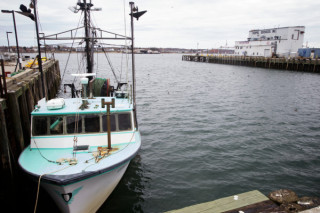 The federal government declared the Northeast groundfish fishery a disaster in 2012. But disaster arguably struck the region’s groundfishing fleet, particularly in Maine, long before that. In 1982, there were 328 vessels from Maine actively fishing for groundfish. By 2012, the number had fallen to 63 vessels participating in the first true industry that took root in colonial America — fishing for cod, haddock, flounder, pollock, hake and other ocean bottom dwellers. In 2014, 52 Maine vessels held groundfish permits. Read the article here 21:20
The federal government declared the Northeast groundfish fishery a disaster in 2012. But disaster arguably struck the region’s groundfishing fleet, particularly in Maine, long before that. In 1982, there were 328 vessels from Maine actively fishing for groundfish. By 2012, the number had fallen to 63 vessels participating in the first true industry that took root in colonial America — fishing for cod, haddock, flounder, pollock, hake and other ocean bottom dwellers. In 2014, 52 Maine vessels held groundfish permits. Read the article here 21:20
Lobster Advisory Council opposes limited lobster licenses
 As a Feb. 10 hearing before the Legislature’s Marine Resources Committee nears, Maine lobstermen continue to debate a bill that would tweak the system by which commercial lobster licenses are issued. The proposals included in the bill were first presented to industry members in a round of town hall-style meetings hosted by Department of Marine Resources Commissioner Patrick Keliher during the summer and fall. The ideas have also been discussed in meetings of the state’s seven regional . Read the article here 08:54
As a Feb. 10 hearing before the Legislature’s Marine Resources Committee nears, Maine lobstermen continue to debate a bill that would tweak the system by which commercial lobster licenses are issued. The proposals included in the bill were first presented to industry members in a round of town hall-style meetings hosted by Department of Marine Resources Commissioner Patrick Keliher during the summer and fall. The ideas have also been discussed in meetings of the state’s seven regional . Read the article here 08:54
The quest to save South Mississippi’s oysters – Fishermen begin oyster relay under DMR program
 The quest to save South Mississippi’s oysters continued Monday. Coast fishermen were out on the Mississippi Sound all morning working to relocate oysters. The fishermen were working with the Department of Marine Resources to not only save the oyster crop, but to also save their livelihood. For the first time in months, the was alive with activity as fishermen readied their boats for a day’s work. Over the past five years, many of these fishermen have had a very limited amount of time on the water, if any. “Everybody’s excited to do it,” said fisherman Shelby Cooper. Read the article here 10:12
The quest to save South Mississippi’s oysters continued Monday. Coast fishermen were out on the Mississippi Sound all morning working to relocate oysters. The fishermen were working with the Department of Marine Resources to not only save the oyster crop, but to also save their livelihood. For the first time in months, the was alive with activity as fishermen readied their boats for a day’s work. Over the past five years, many of these fishermen have had a very limited amount of time on the water, if any. “Everybody’s excited to do it,” said fisherman Shelby Cooper. Read the article here 10:12
Marine Resources Committee schedules hearing on elver legislation
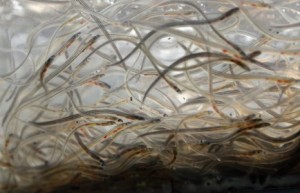 The Legislature’s Marine Resources Committee has scheduled a public hearing on a bill introduced by Rep. Walter Kumiega (D-Deer Isle) that would give the Department of Marine Resources more flexibility in managing the elver fishery. The hearing is scheduled for 10 a.m. on Wednesday, Jan. 13, in Room 206 of the Cross Building in Augusta. Kumiega has also offered a bill that, he said, would improve the state’s lobster licensing procedures and reduce the waiting time for fishermen trying to enter the fishery. Read the article here 09:55
The Legislature’s Marine Resources Committee has scheduled a public hearing on a bill introduced by Rep. Walter Kumiega (D-Deer Isle) that would give the Department of Marine Resources more flexibility in managing the elver fishery. The hearing is scheduled for 10 a.m. on Wednesday, Jan. 13, in Room 206 of the Cross Building in Augusta. Kumiega has also offered a bill that, he said, would improve the state’s lobster licensing procedures and reduce the waiting time for fishermen trying to enter the fishery. Read the article here 09:55


































